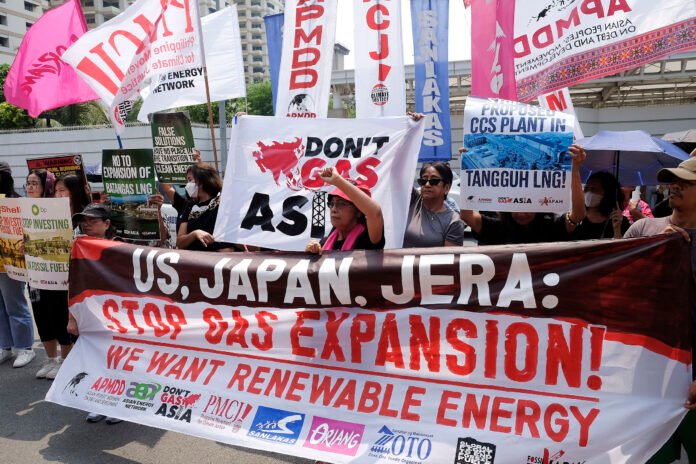MANILA- Climate activists have called on urged Japan to “undertake drastic measures to rapidly phase out fossil fuel investments in Asia” in line with global climate goals instead of promoting fossil gas and false technology solutions, like ammonia co-firing, in the three-day Japan Energy Summit which begins in Tokyo today, June 3.
Pro-climate proponents reminded summit attendees that “False Solutions Have No Place In The Transition To Clean Energy” as they held mass actions in the Philippines, Bangladesh, and Indonesia to protest Japan’s “greenwashing and dirty trail of gas financing” which has made the country a top fossil fuel lender and financier in the world.
They also called on Japanese Prime Minister Fumio Kishida to stop making Asia a “dumping ground of harmful and dangerous gas under the pretext of providing energy security for the region.”
“In the face of the climate crisis, an industry summit celebrating and strengthening fossil fuel companies is truly reprehensible. The Japan Energy Summit does not ‘accelerate the energy transition’ as they claim, but further delays it. We need solar and wind power to replace fossil fuel energy systems as rapidly as possible,” Lidy Nacpil, coordinator of the Manila-based Asian Peoples’ Movement on Debt and Development, said in a statement.
Ian Rivera, national coordinator of the Philippine Movement for Climate Justice, agreed. “Every day that Japan fails to act on the climate crisis, the situation becomes more dire.
This Summit only serves to legitimize the false solutions that Japan is propagating. Japan must instead increase investments in renewable energy and support the just energy transition for a more livable planet and sustainable future for all,” he pointed out.
In its report last May titled ” Strategies for Affordable and Fair Clean Energy Transitions, the International Energy Agency (IEA) endorsed “clean energy technologies” for being “more cost competitive over their lifespans than those reliant on conventional fuels like coal, natural gas, and oil. Solar PV and wind are the cheapest options for the new generation.”
But instead of helping save the planet, “Japan has continuously failed its climate obligations by growing Asia’s fossil fuel appetite,” noted Rere Christanto, Campaigns Director of WALHI Indonesia.
“Instead of embracing a just transition towards renewable energy, the Japanese government, its companies, and the fossil fuel industry is digging its heels towards more coal, gas and oil projects,” he added.
Japan Energy Summit 2024 is hosted by leading power company JERA and over 4,000 representatives from the sector are expected to attend, including those from Japan’s Ministry of Economy, Trade and Industry (METI), Tokyo Gas, BP, and Exxon.
It is seen as a key event for the Japanese LNG and gas industries.
Meanwhile, Flor Santos of the women’s group Oriang remarked: “As every year we experience more extreme weather events, any industry event like this further pushes our progress back more years which we cannot afford. Solving the climate crisis requires emancipating the people to demand what is right and just. End fossil fuel use now!”
Over in Dhaka, Shariff Jamil, a leader of Waterkeepers Bangladesh, pointed out: “By catering to the interests of the fossil fuel industry, the Japan Energy Summit is guaranteeing a future with more erosion, floods, droughts, and storms. We urge them to put people and the planet first over profits, respect human rights, and support the urgent transition from dangerous fossil fuels to renewable energy.”
A report from the non-profit group Oil Change International identified Japan as the world’s second-largest provider of international public finance for fossil fuels, the world’s largest provider of international public finance of fossil gas, and the No. 1 financier of international public finance for LNG export capacity, The Japanese government considers thermal power with CCS (carbon capture and storage), ammonia co-firing with coal power, and hydrogen power generation as part of their decarbonization strategies.
However, the Intergovernmental Panel on Climate Change (IPCC), in its Sixth Assessment Report, labeled CCS and the other approaches as “immature,” unproven technologies in the power generation sector. Japan is also the only G7 country that is not a member of the Powering Past Coal Alliance (PPCA).
Photo courtesy of Asia Press Photo





